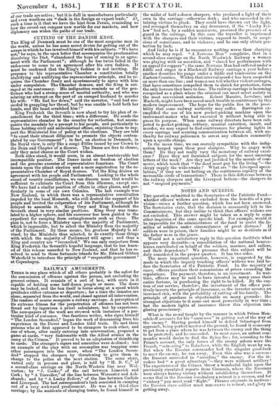RAILWAY AMUSEMENTS.
Timm? is one, place which of all others probably is the safest for the commission of offences against the person, not excluding the gravest crimes. It consists of a sort of box, with seats in it capable of holding some half-dozen people or more. The doors may be locked, and the box itself is borne along at a.speed which precludes either entrance or departure; for a time the inmates are alone, separated from- the world, and closed against all intervention. The readers of course recognise a railway carriage. A perception of its extreme fitness for 'the perpetration of offences has not been found out 'by ingenious a priori calculators, but by experience. The newspapers of the week are strewed with instances of a par- ticular kind of nuisance. One facetious writer, who signs himself "The London Scoundrel," began the work -of denouncing from his experience in the Dover and London tidal train. He met three persons who at first appeared to be strangers to each other, and one of whom, after easily entering into conversation, proposed a game at cards, " very fashionable with the Allied armies in the camp at the Crimea." It proved to be an adaptation of thimblerig to cards. The stranger% cigars and amenities were declined ; but an example of the play with .an accomplice was trapping some other passengers into the snare, when -" The London Scoun- drel" stopped the sharpers by threatening to give them in charge to the police at the next station. The same story, varied only in persons and place, is told by " H. B. C.," of a second-class carriage on the North-Western line near Wol- verton; by "J. Cooke," of the rail -between Limerick and Cork ; by "A Traveller," of the line. between Worcester and Ash- church ; and by " A Lucky Fellow," of the line between Carlisle and LiverpooL The last correspondent's luck consisted in escaping out of a very awkward predicament. He was in a thiidelass carriage; by the accidents of changing trains, he found himself in the midst of half a-dozen sharpers, who produced a light of their own in the carriage—otherwise dark ; and who succeeded in ob- taming victims to pluck. They could have thrown out the light, and revenged themselves on any denouncer, if the " Lucky Fel- low" had not, by a sudden manoeuvre, procured the presence of a guard in the carriage. In this case the traveller is imprisoned with the sharpers and their victims, exposed to insult, to suspi- cions of connivance, and to violence; and he can only obtain pro- tection by luck.
And lucky he is if he encounters nothing worse than sharping which he may repel. "A Nervous Man" complains, that in a second-class carriage on the North Woolwich Railway a woman was playing with an accordion, and "closed her performance with an appeal for coppers " ; the same Nervous Man had suffered under a fiddle and singer in a Blackwell Railway carriage a year before; another describes his pangs under a fiddle and tambourine on the Eastern Counties. Within that interval murder has been suspected on more than one line ; and women can tell whether violent outrages, that have sometimes compelled them to shriek for protection, form the only horrors they have to face. The railway-carriage is becoming recognized as a place where the criminal can meet select society in the most convenient seclusion. Robert Maeaire, Lovelace, and Macbeth, might have been saved much trouble in contrivance by this modern improvement. The hope for the public lies in the possi- bility that some railway authority may suffer. Barrington ex- emplified the use of his new pocket-picking machine upon the instrument-maker who had executed it without being able to guess its purpose. When some railway directors have been sub- jected to pocket-picking, robbery, musical extortion, insult, and murder, we may expect to find contrivances for planing lights in every carriage and securing communication between all, with au- thority for railway policemen to arrest any offenders summarily upon a specific charge. In the mean time, we can scarcely sympathize with the indig- nation heaped upon these poor sharpen. Why be angry with them ? Do they not really vary the monotony of railway exist- ence ? Have they not furnished subjects for the most amusing letters of the week ? Are they not justified by the morals of com- merce, which teach that " the dead must pay for the living "—the sleepy supply the wide-awake ? What are " the Liverpool specu- lations," if they are not betting on the continuous rapidity of the mercantile circle of transactions ? There is this difference between the railway sharpers and the Liverpool betters—the sharpers do. not " suspend payments."
























 Previous page
Previous page